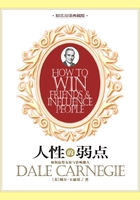
第11章 Fundamental Techniques…(11)
That’s bad, but it can be avoided. If you make your deliveriesat the pier in the morning when possible, your trucks will be ableto keep moving, your freight will get immediate attention, and ourworkers will get home early at night to enjoy a dinner of the deliciousmacaroni and noodles that you manufacture.
Regardless of when your shipments arrive, we shall alwayscheerfully do all in our power to serve you promptly. You are busy.
Please don’t trouble to answer this note.
Yours truly,
J—B—, supt.
Thousands of salespeople are pounding the pavements today,tired, discouraged and underpaid. Why? Because they are alwaysthinking only of what they want. They don’t realize that neitheryou nor I want to buy anything. If we did, we would go outand buy it. But both of us are eternally interested in solving ourproblems. And if salespeople can show us how their services ormerchandise will help us solve our problems, they won’t need tosell us. We’ll buy. And customers like to feel that they are buying—not being sold.
Yet many salespeople spend a lifetime in selling without seeingthings from the customer’s angle. For example, for many yearsI lived in Forest Hills, a little community of private homes inthe center of Greater New York. One day as I was rushing to thestation, I chanced to meet a real-estate operator who had boughtand sold property in that area for many years. He knew ForestHills well, so I hurriedly asked him whether or not my stucco housewas built with metal lath or hollow tile. He said he didn’t know andtold me what I already knew—that I could find out by calling theForest Hills Garden Association. The following morning, I receiveda letter from him. Did he give me the information I wanted? Hecould have gotten it in sixty seconds by a telephone call. But hedidn’t. He told me again that I could get it by telephoning, and thenasked me to let him handle my insurance.
He was not interested in helping me. He was interested onlyin helping himself.
J. Howard Lucas of Birmingham, Alabama, tells how twosalespeople from the same company handled the same type ofsituation, He reported:“Several years ago I was on the management team of a smallcompany. Headquartered near us was the district office of a largeinsurance company. Their agents were assigned territories, andour company was assigned to two agents, whom I shall refer to asCarl and John.
“One morning, Carl dropped by our office and casuallymentioned that his company had just introduced a new lifeinsurance policy for executives and thought we might beinterested later on and he would get back to us when he had moreinformation on it.
“The same day, John saw us on the sidewalk while returningfrom a coffee break, and he shouted: ‘Hey Luke, hold up, I havesome great news for you fellows.’ He hurried over and veryexcitedly told us about an executive life insurance policy hiscompany had introduced that very day. (It was the same policythat Carl had casually mentioned.) He wanted us to have oneof the first issued. He gave us a few important facts about thecoverage and ended saying, ‘the policy is so new, I’m going tohave someone from the home office come out tomorrow andexplain it. Now, in the meantime, let’s get the applications signedand on the way so he can have more information to work with.’
His enthusiasm aroused in us an eager want for this policyeven though we still did not have details, When they were madeavailable to us, they confirmed John’s initial understanding of the policy, and he not only sold each of us a policy, but later doubledour coverage.
“Carl could have had those sales, but he made no effort toarouse in us any desire for the policies.”
The world is full of people who are grabbing and self-seeking.
So the rare individual who unselfishly tries to serve others has anenormous advantage. He has little competition. Owen D. Young,a noted lawyer and one of America’s great business leaders, oncesaid: “People who can put themselves in the place of other peoplewho can understand the workings of their minds, need neverworry about what the future has in store for them.”
PRINCIPLE 3:
Arouse in the other person an eager want.